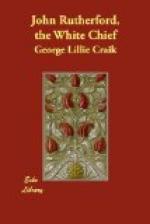In one case which Marsden mentions, the brother of a chief, named Ahoudee Ogunna,[BA] conceiving himself to have been improperly treated by one of the missionaries, stole two earthen pots from another of them; but the explanation which the chief gave of the matter was that his brother had not stolen the pots, but had only taken them away with an intention to bring on an explanation respecting the conduct which had given him offence. The man’s expectation here evidently was that his theft (if it was to be so called) would merely have the effect of making the missionaries as angry as he himself was, and so of rendering both parties equally anxious for a full discussion of their differences. He had himself, as he conceived, been affronted in a manner not to be passed over; and his stealing of the pots he meant merely as a spirited act of retaliation, which would in some degree throw back the insult he had received upon those who had inflicted it, and make them in their turn feel mortified and on fire for satisfaction.
He certainly did not imagine for a moment that he was at all degrading himself by the method he adopted for attaining this end. The degradation, in his conception of the matter, would be all with the party robbed. He had, however, in his anger, forgotten one thing, which, according even to the notions of the New Zealanders, it was most material that he should have remembered, as his more considerate brother felt as soon as he heard of the transaction, and as even he himself was afterwards brought to acknowledge. The chief, besides having experienced much kindness from the missionaries, was the very person from whom they had purchased the ground on which their settlement was established, and on whose friendship, at least, they had therefore a fair right to count, if they were not even to regard themselves as in some degree under his special protection. That personage felt the force of these considerations so strongly that, in order to show how much he was vexed and ashamed at his brother’s conduct, he burned his own house to the ground, and left his usual place of residence, with a determination never to return to it so long as his brother lived.
On the morning of his departure, the high-spirited chief came to take leave of the missionaries, when he told them that he had been on the spot where his house stood before he burned it, to weep with his friends, and showed them how much he had lacerated his face, arms, and other parts of his body, in which his friends had followed his example. His brother, too, at last came to them, quite penitent for his hasty conduct, and offered to restore the only one of the pots which he still had, the other having been already stolen from him by one of his countrymen. Accordingly, he soon after sent his son with the article; and the boy having been presented with six fish-hooks, he immediately brought them back, with a message, that his father would take nothing for the pot.




